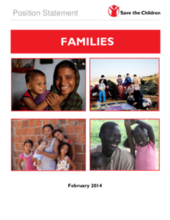This position statement by Save the Children recognises that the word 'family' has different meanings to people around the world, encompassing diverse family structures, relationships, and power dynamics, across countries and cultures, and that it is also a dynamic concept with new variants on traditional family structures have emerged in response to social change, conflict, urbanization, HIV/AIDS and other crisis. The statement highlights that the family is central to numerous international legal instruments, including the UN Convention on the Rights of the Child, but that none of these instruments define it. The Committee on the Rights of the Child has emphasized, however, that it is a concept reaching beyond the so-called nuclear family model and encompassing a range of care-giving environments, including the extended family and other traditional and more recent arrangements, provided these are consistent with children's rights and best interests. The organisation then clarifies its own understanding of families as "social groups connected by kinship, marriage, adoption or choice. Family members have clearly defined relationships, long-term commitments, mutual obligations and responsibilities, and a shared sense of togetherness. Families are the primary providers of protection, support and socialisation for children and youth."
The statement reviews the critical role and responsibilities of families to ensure that children survive, thrive and develop according to their age, gender and their evolving capacity, and the responsibility of the States to support parents and care-givers in their child-rearing role, as laid out in international and regional treaties. It emphasizes, among other things, the importance of family policies, including financial support, parenting education and day care provision, to support family care givers in delivering their responsibilities for the care and protection of children. It highlights the challenges faced by families in that regard, and the impact of poverty, war, natural disasters and migration that can undermine the capacity of these families and the importance of acting to prevent unnecessary separation. It underlines the role and responsibility of the State to take action to prevent and respond to violence against children, including violence in the home, and to invest in a range of alternative family-based care options for children rather than institutional care. This includes support to the extended family members caring for children.

